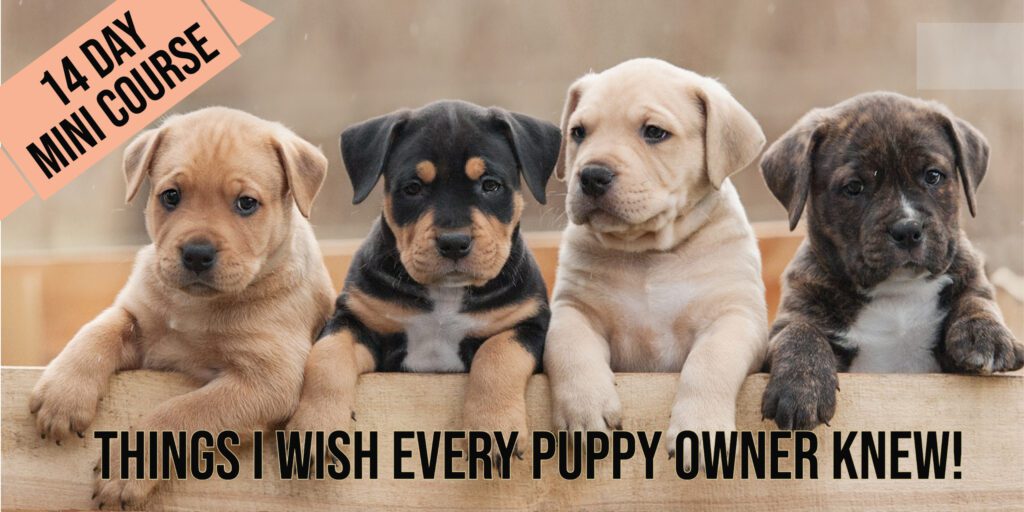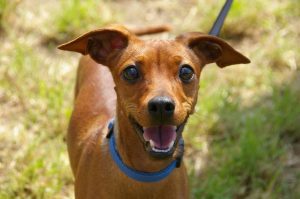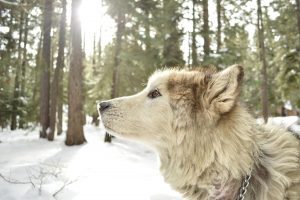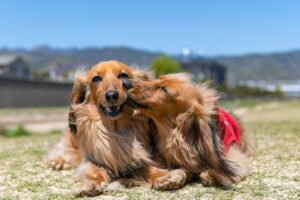Need help with Reactive Dog Behaviour? Join my FREE Facebook support group...
Toilet training tips for dogs and puppies
Housetraining a puppy is tricky business, it can be hard work and often takes longer than expected. Here are my top toilet training tips, for dogs and puppies, to get you off to the best start, or back on track!
Watch them like a hawk!
It’s not instinctive for a puppy to go outside for their toilet, but they do prefer to be away from their sleeping area. This means they will naturally sneak off when they need to go. They might also sniff the ground and walk in circles too. We can take advantage of these instinctive behaviours to help them learn what we want them to do. But, you’ll need watch them like a hawk throughout this stage. Never let them out of sight, as that’s the time they will probably be looking for a spot and you’ll miss that crucial sniffing behaviour.
A crate, or training cage, can be a good option if there are times you can’t watch your pup. When they are in their crate, they can’t move away from their sleeping area so they will naturally hold on until they get out. Hopefully, you will take your pup to the toilet area after they have been in their cage, so this helps them to get it right and earn a reward. It also helps them strengthen their bladder and bowel so they’ll be able to hold on for longer next time.
As well as watching them like a hawk, it will help to create a predictable routine of eating and sleeping. When you do this, toilet needs become more predictable. So you will spend less time waiting outside when they don’t need to go. You’ll become more predictable too, so your pup will hold on for longer if they feel confident you will take them out soon.
Handling accidents
House training is a long process, so there will be accidents. And they are just accidents. Don’t scold a dog or puppy that has made a mistake, it won’t speed up the process, in fact it might hinder it. A pup already instinctively wants to sneak off when they need the toilet, making them anxious about it will encourage them to do that more. Anxiety can trigger the bladder and bowel too, so they might suddenly need to go again straight after being told off.
Instead, just clean it up well, and watch more vigilantly in the future. There are loads of cleaning products that are good for this but white vinegar is ideal as it neutralises urine smells. Just make sure to test it first to make sure it doesn’t ruin your carpet. If your dog has had a lot of accidents already, it might be better to get the whole carpet professionally cleaned before starting afresh.
The garden
If you are taking your pup to the garden for toilet breaks, it is a good idea to clear away the toys. A puppy will quickly forget why they came outside when they start playing with their toys. It won’t be until you go back inside that they remember what they were their for, and then you are at risk of having an accident. When the garden is cleared of toys, they can get on with the business of going to the toilet. It will also help if you stay quiet and boring. People can be just as distracting as a toy, so stay quiet while you wait for them to find their spot and take care of business. There will be time for play after!
It doesn’t take much to distract a puppy!
Dogs and puppies often have preferences for where they do their pee’s and poo’s. If you are at the start of the process, allow them to roam around the garden until they pick out the areas they like. Once they have their spots defined, it’ll be easy to direct them to those places when you bring them out in the future. Sniffing can stimulate bowel movements, so if you see plenty of sniffing, and they are due to poop, you’ll know to stick around a little longer!
While your pup is still learning, you’ll need to be ready to reward them when they go outside. The faster you can reward them, the more likely they’ll connect the reward with the action. It’s easy to think that they will know what the treat is for, but unless they get it quickly, they will have moved on to something else and will think they are being rewarded for that instead. In no time, you’ll get a dog that is no better at housetraining, but brilliant at jumping up for attention straight after peeing on the lawn! So keep a pot of treats ready by back door, and grab a couple on the way out.
It takes time
Dogs use a process of trial and error when they learn. This means that until they know for certain what you want, they will continue to try different things. Pretend pee’s are a part of this process, so don’t worry if your dog fakes the odd pee in the garden. He might also try relieving himself in different places just to test that too.
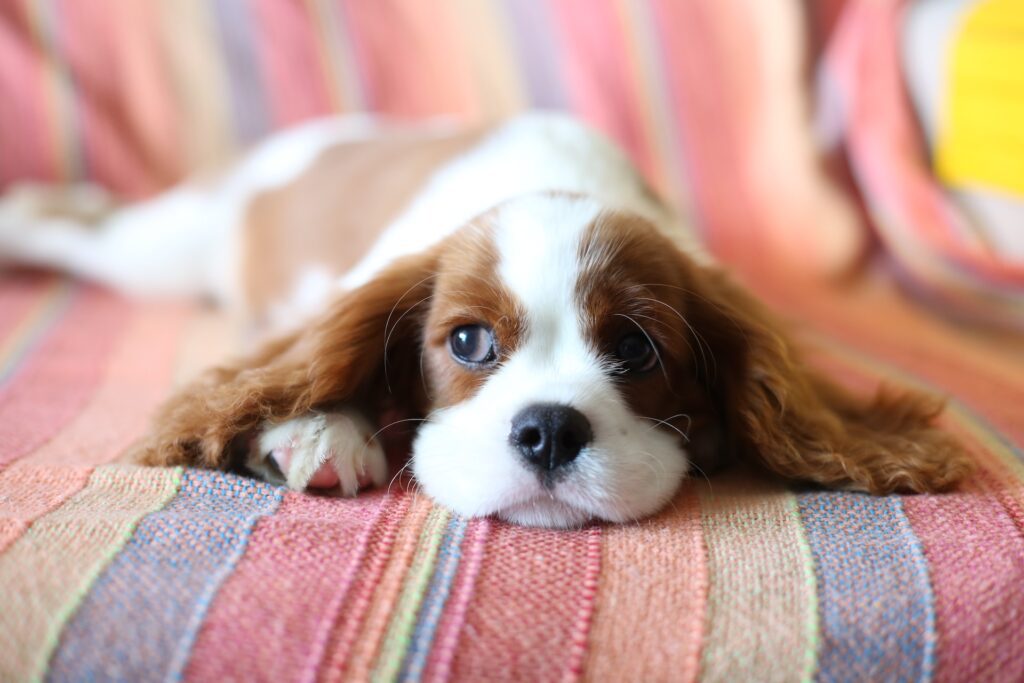
The important thing is to be vigilant. Make sure you are ready to go outside when you see signs of needing to go, and be ready to reward them when they toilet in the right place. Consistency is king. Every failed, or slow, reward is a missed opportunity to help your dog learn faster. We know they test what they know; imagine not rewarding them quickly enough on a test pee, you could knock their training right back to the beginning.
Also, remember that they are fighting their instincts when they try to please you at toilet time. It would be much easier for your pup to just poop behind the curtain. Doing it your way means holding on, which is really uncomfortable. So if your consistency breaks, or you stop rewarding too soon, they will quickly revert to habits that suit their needs better.
What can go wrong?
Pups don’t instinctively know its ok to toilet on their walks. It makes sense really, especially if you are housetraining a young puppy. You’ve just spent five weeks teaching them to go in the garden and they are probably getting quite good at that. Now they are going out into the big wide world. They don’t know the same rule applies yet. So, until they get good at this, take your pup to their toilet spot before and after every walk. I have lost track of the amount of times I am told about dogs that pee in the house straight after their walk.
Many pups and dogs never learn to ask when they need to go out. This is better though, as it causes confusion and frustration when you aren’t there to respond to their request. Instead, make sure to always take them out at regular intervals, and especially after meals, sleep, and play. This way they will learn to hang on until you take them out. They’ll be ok with that, as long as you don’t expect them to hold on for long periods. You might be tempted to install a doggy door, but this will undo your training really fast, as you will see in a moment,
They don’t know it yet
Some people mistake a guilty look as proof their puppy knew they had done wrong. Dogs don’t feel complex emotions such as guilt. So, what you are actually seeing is a puppy trying to appease an angry owner, not an admission of failure. Often this coincides with an accident in the house, so we think they knew they should have gone outside and were just being naughty or defiant.
Puppy pads frequently backfire. In the same way pups learn to go in the garden, and not on the walk. They can also learn to go only in the house. Once they have learned that, it will be hard to break that habit, and they will them have to re-learn the whole process. It’s much easier to just go outside from the start. Plus, many dogs aren’t good at peeing ON a pad. Many miss the pad completely while they stand with one foot on the corner, or worse, they lift their leg and pee up the wall!
And finally, too much freedom in the house and garden can cause big problems. A pup or dog that has free reign will toilet all over the place without any feedback. This is especially true of dogs that have access to a doggy door, or run about the whole house. Sometimes they will pee in the right place, sometimes not. But if there is no reward when they get it right, and no intervention when they get it wrong, there is no distinction between the two options. In no time, your housetraining is completely undone.
Do you have a new puppy?
Check out my puppy behaviour courses and get them off to the best start. No need to wait for your puppy to arrive, get prepared now and start out like you’ve had dogs for years! Or choose the right course for your puppies age and get started with your daily tasks right away!
